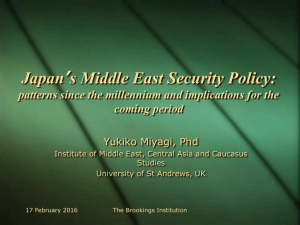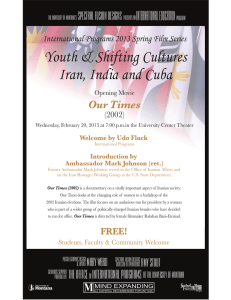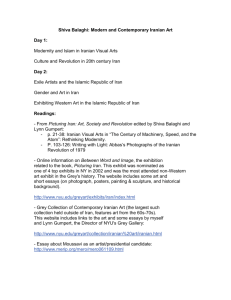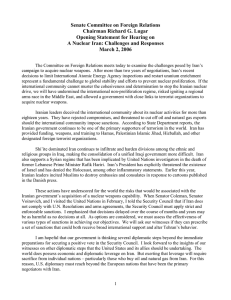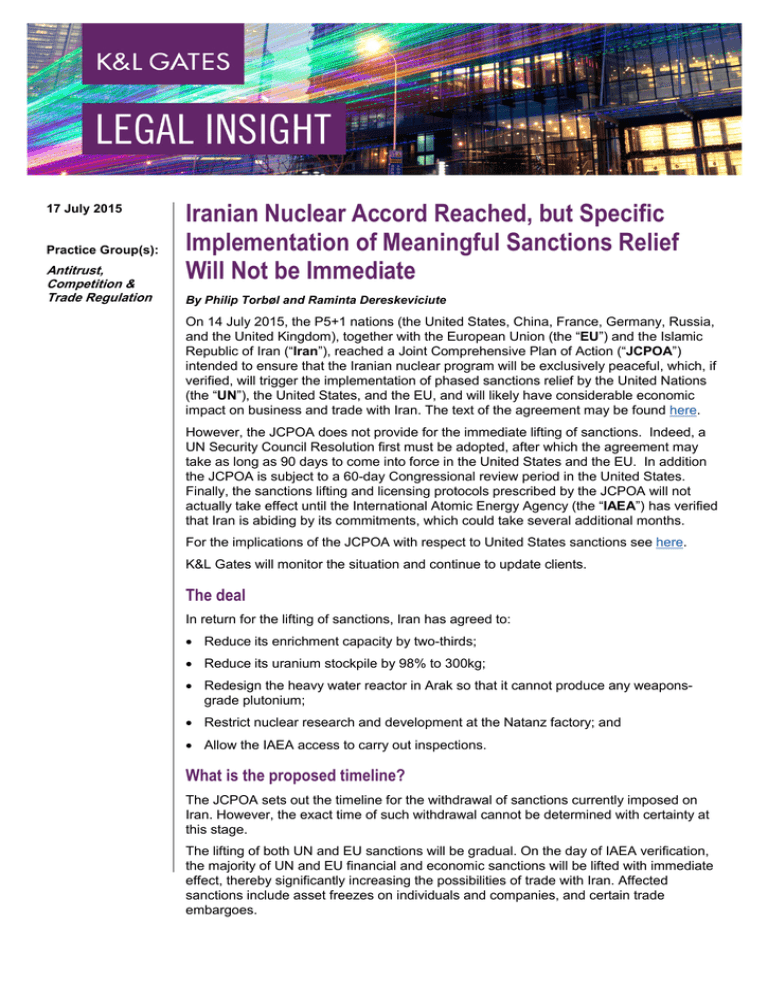
17 July 2015
Practice Group(s):
Antitrust,
Competition &
Trade Regulation
Iranian Nuclear Accord Reached, but Specific
Implementation of Meaningful Sanctions Relief
Will Not be Immediate
By Philip Torbøl and Raminta Dereskeviciute
On 14 July 2015, the P5+1 nations (the United States, China, France, Germany, Russia,
and the United Kingdom), together with the European Union (the “EU”) and the Islamic
Republic of Iran (“Iran”), reached a Joint Comprehensive Plan of Action (“JCPOA”)
intended to ensure that the Iranian nuclear program will be exclusively peaceful, which, if
verified, will trigger the implementation of phased sanctions relief by the United Nations
(the “UN”), the United States, and the EU, and will likely have considerable economic
impact on business and trade with Iran. The text of the agreement may be found here.
However, the JCPOA does not provide for the immediate lifting of sanctions. Indeed, a
UN Security Council Resolution first must be adopted, after which the agreement may
take as long as 90 days to come into force in the United States and the EU. In addition
the JCPOA is subject to a 60-day Congressional review period in the United States.
Finally, the sanctions lifting and licensing protocols prescribed by the JCPOA will not
actually take effect until the International Atomic Energy Agency (the “IAEA”) has verified
that Iran is abiding by its commitments, which could take several additional months.
For the implications of the JCPOA with respect to United States sanctions see here.
K&L Gates will monitor the situation and continue to update clients.
The deal
In return for the lifting of sanctions, Iran has agreed to:
• Reduce its enrichment capacity by two-thirds;
• Reduce its uranium stockpile by 98% to 300kg;
• Redesign the heavy water reactor in Arak so that it cannot produce any weaponsgrade plutonium;
• Restrict nuclear research and development at the Natanz factory; and
• Allow the IAEA access to carry out inspections.
What is the proposed timeline?
The JCPOA sets out the timeline for the withdrawal of sanctions currently imposed on
Iran. However, the exact time of such withdrawal cannot be determined with certainty at
this stage.
The lifting of both UN and EU sanctions will be gradual. On the day of IAEA verification,
the majority of UN and EU financial and economic sanctions will be lifted with immediate
effect, thereby significantly increasing the possibilities of trade with Iran. Affected
sanctions include asset freezes on individuals and companies, and certain trade
embargoes.
Iranian Nuclear Accord Reached, but Specific
Implementation of Meaningful Sanctions Relief Will Not
be Immediate
The UN arms embargo will remain for five years and the embargo on the import of
ballistic missile technology will remain for eight years, calculated from the day on which
the IAEA verifies Iran’s implementation of the relevant measures under the JCPOA.
However, both types of embargoes may be lifted at an earlier date if the IAEA finds that
Iran’s use of nuclear material is peaceful.
It is only 10 years after the JCPOA comes into effect that both UN and EU sanctions
regimes will fully come to an end, at which time the EU will remove all remaining nuclearrelated sanctions and the UN will no longer reserve the right to take action in respect of
Iran.
What if Iran breaks the deal?
Until the UN and EU nuclear-related sanctions regimes end, an eight member Joint
Commission comprising the representatives of the P5+1, the EU and Iran will monitor
compliance with the JCPOA. Should Iran at any time violate the measures imposed on it
under the JCPOA, the Joint Commission will seek to resolve the dispute or else refer it to
the UN Security Council, which could choose to continue sanctions relief or reimpose
sanctions on Iran.
Background: the existing nuclear-related EU sanctions against Iran
Since 2007, the EU has been imposing several different types of sanctions against Iran in
an attempt to persuade the Government of Iran to comply with Iran’s international
obligations and to reduce its nuclear and missile programmes.
EU sanctions relating to Iran’s nuclear programme partly implement UN sanctions, and
partly follow an autonomous decision of the Council of the EU. These sanctions consist
of several different measures and relate to many sectors, including:
• Financial, banking and insurance
Currently, all financial transfers to and from Iran are either prohibited or subject to an
authorisation regime. It is prohibited for Iranian banks to open branches and create
joint ventures in the EU, and for EU financial institutions to open branches or bank
accounts in Iran. It is also prohibited to provide insurance and re-insurance to the
Government of Iran and to Iranian companies, as well as to supply financial
messaging services to listed persons.
EU Member States are not allowed to provide any support for trade with Iran, or enter
into new commitments for grants, or offer financial assistance or concessional loans to
the Government of Iran. Finally, it is prohibited to deal in Government of Iran publicguaranteed bonds.
• Oil, gas and petrochemical
Under the current regime, it is prohibited to import crude oil, petroleum products,
natural gas, and petrochemical products from Iran. It is also prohibited to export key
equipment and technology for the oil and gas industries to Iran, and to invest in those
Iranian industries, as well as in the Iranian petrochemical industry.
• Shipping, shipbuilding and transport
It is prohibited to construct new oil tankers for Iran or to participate in their
construction, and it is also prohibited to supply key naval equipment for shipbuilding
and maintenance to Iran.
National customs authorities may carry out specific controls on all cargo to and from
Iran, and cargo flights operated by Iranian carriers or coming from Iran cannot have
access to EU airports (except mixed passenger and cargo flights). In addition, no
2
Iranian Nuclear Accord Reached, but Specific
Implementation of Meaningful Sanctions Relief Will Not
be Immediate
flagging or classification services may be supplied to Iranian oil tankers or cargo
vessels.
• Gold, other precious metals, banknotes and coinage
It is prohibited to deliver Iranian denominated banknotes and coinage to the Iranian
central bank.
• Nuclear proliferation
The export and import of goods and technology related to nuclear enrichment or
nuclear weapon systems are either prohibited or subject to strict controls.
It is also prohibited for Iranian nationals and entities to invest in uranium mining or the
production of nuclear material and technology within the EU.
In addition, it is prohibited to export and import dual-use goods and technology.
• Metals
It is prohibited to export graphite, and raw or semi-finished metals, such as aluminium
and steel, relevant to industries controlled by the Iranian Revolutionary Guard Corps
or which are relevant to Iran's nuclear, military and ballistic missile programme.
• Software
Current sanctions prohibit dealing in software for integrating industrial processes
relevant to industries controlled by the Iranian Revolutionary Guard Corps or which
are relevant to Iran's nuclear, military and ballistic missile programme.
• Arms
It is prohibited to deal in arms and related materiel with Iran.
• Listing of persons, entities and bodies (asset freeze and visa ban)
The existing sanctions provide for the freezing of the assets of, and the imposition of a
visa ban on, targeted individuals and entities, including: banks and persons, and
entities and bodies related to most of the sectors noted above.
At the moment visa bans apply to 94 persons (43 of which are designated by the UN).
The number of listed entities amounts to 471, including the Iranian central bank (78 of
which are designated by the UN). They include companies operating in the banking
and insurance sectors, the nuclear technology industry and in the industries of
aviation, armament, electronics, shipping, chemicals, metallurgy and oil and gas.
Providing specific services associated with the activities in the paragraphs above is also
prohibited; such services include technical assistance, training, finance or financial
assistance.
Please note that some of the sanctions above are currently suspended to allow the
reaching of an agreement between the P5+1 and Iran. This is the case for sanctions
relating to gold and precious metals, the insurance and transport of Iranian crude oil, and
imports of petrochemical products.
3
Iranian Nuclear Accord Reached, but Specific
Implementation of Meaningful Sanctions Relief Will Not
be Immediate
Authors:
Philip Torbøl
Philip.Torbøl@klgates.com
+32.(0)2.336.1903
Raminta Dereskeviciute
Raminta.Dereskeviciute@klgates.com
+44.(0)20.7360.8264
Anchorage Austin Beijing Berlin Boston Brisbane Brussels Charleston Charlotte Chicago Dallas Doha Dubai Fort Worth Frankfurt
Harrisburg Hong Kong Houston London Los Angeles Melbourne Miami Milan Moscow Newark New York Orange County Palo Alto
Paris Perth Pittsburgh Portland Raleigh Research Triangle Park San Francisco São Paulo Seattle Seoul Shanghai Singapore
Spokane Sydney Taipei Tokyo Warsaw Washington, D.C. Wilmington
K&L Gates comprises more than 2,000 lawyers globally who practice in fully integrated offices located on five
continents. The firm represents leading multinational corporations, growth and middle-market companies,
capital markets participants and entrepreneurs in every major industry group as well as public sector entities,
educational institutions, philanthropic organizations and individuals. For more information about K&L Gates or
its locations, practices and registrations, visit www.klgates.com.
This publication is for informational purposes and does not contain or convey legal advice. The information herein should not be used or relied upon
in regard to any particular facts or circumstances without first consulting a lawyer.
© 2015 K&L Gates LLP. All Rights Reserved.
4




